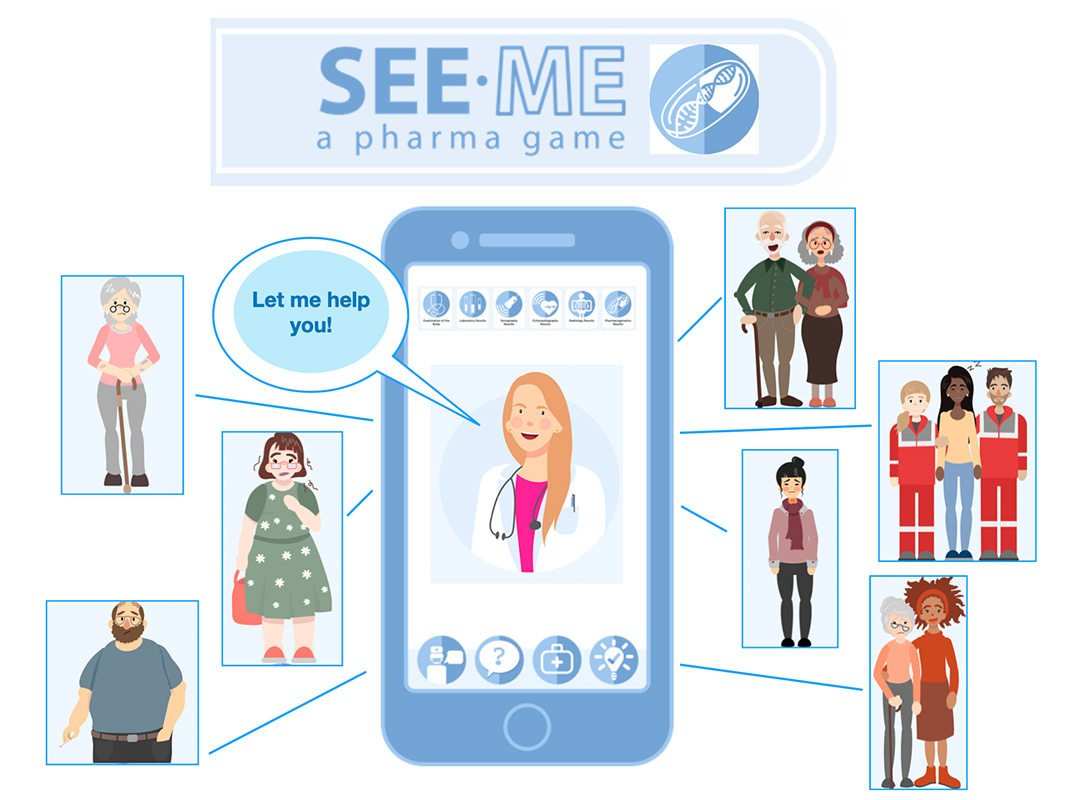More than a Serious Game
Despite being a forerunner of personalised medicine, pharmacogenomics (PGx) is not yet routinely applied in patient care. Education is a crucial step for the successful implementation of PGx into the clinic. We need to offer collaborative, interprofessional approaches that encourage learning about PGx on an international level. It is especially important that PGx education enables the development of one's own thoughts and ideas to be able to understand and implement this rapidly developing field of science.

The SeeMe game offers an easy and interactive way to learn about adverse drug reactions and polypharmacy. The player is in the role of a physician who offers consultation hours for patients. They need to come up with a diagnosis, taking into account symptoms reported and drugs taken.
© U-PGx-project
Pharmacogenomics and the U-PGx project
Pharmacogenetic variation in genes encoding drug transporters and drug metabolizing enzymes affects drug disposition, resulting in both under-dosing and overdosing of affected individuals. This, in turn, increases the risks of non-response and adverse drug reactions. Guidelines of dose recommendations that account for this genetic diversity, and information on gene-drug combinations is available.

Henk-Jan Guchelaar
Professor of Clinical Pharmacy
Chair Dept. Clinical Pharmacy & Toxicology
Leiden University Medical Center
© LUMC
“The U-PGx serious game SeeMe offers an innovative possibility to train recognizing adverse drug reactions in the context of pharmacogenomics.”
In the U-PGx project, pre-emptive pharmacogenetic testing and stratified prescribing of drugs, based on these pharmacogenetic guidelines, was implemented in 7 European countries, and the clinical benefit and cost-effectiveness of this novel approach will now be assessed. The results of the U-PGx project will be published soon, and show that using a patient’s genetic profile, instead of choosing the ‘one size fits all’ approach for prescribing drugs, indeed results in safer and more effective drug therapy.
The U-PGx project was coordinated by Henk-Jan Guchelaar, Professor of Clinical Pharmacy and Chair of the Department of Clinical Pharmacy & Toxicology at the Leiden University Medical Center, Netherlands. The U-PGx project has received funding from the European Union’s Horizon 2020 research and innovation programme under grant agreement No 668353.

“The integration of the technical device by designing the game in a telemedicine situation, will improve the realness and train the players in adopting a telemedicine approach, which could be used for successful implementation of personalised drug safety and medicine."
Julia Stingl
Professor of Clinical Pharmacology
Director of the Institute of Clinical Pharmacology
University Hospital of RWTH Aachen
© Uniklinik RWTH Aachen
The Ubiquitous Pharmacogenomics Education programme
Educating and training of healthcare professionals from independent academic institutions such as universities seems to be one of the most important steps to close the gap between the research base and patient care. For these reasons, one work package of the U-PGx project was the development of an educational programme that includes Web-based seminars, e-learning opportunities, and the development of a serious game on personalised drug safety. This work package was led by Julia Stingl, Professor of Clinical Pharmacology and Chair of the Institute of Clinical Pharmacology at the University Hospital RWTH Aachen, Germany. It aims to disseminate PGx knowledge to the future generation of healthcare professionals and to develop the knowledge and skill sets to embrace PGx implementation.
Based on the conceptual ideas on educational activities to improve the implementation of pharmacogenomics into the clinic, an English-language serious game, called SeeMe, for recognizing adverse drug effects in specific patient profiles was developed. This serious game offers a more intuitive and practical training to recognize adverse drug reactions in the context of personalised medicine in daily life. To this end, interactive case studies were created. Within the game, the player is in the role of the physician who offers consultation hours. The player gets contacted by patients with symptoms that are adverse drug reactions and can be associated with pharmacogenomics variants. The player needs to work those cases up interrogating the patients and deciding about further exams, coming to a diagnosis and understanding the context between symptoms reported and drugs taken. The game transfers existing pharmacological knowledge into the clinical everyday life of physicians and raises awareness for relevant and individual clinical problems in the context of adverse drug reactions and polypharmacy.
This serious game was tested with more than 200 medical students of the RWTH Aachen University in Germany. All students were pretested concerning knowledge about adverse drug reactions and filled in a questionnaire about attitudes towards recognizing adverse drug reactions and clinical pharmacology. The students got approximately two months to play the game. After that time, the knowledge was tested again and the game was evaluated.
Results of the evaluation of the serious game were analysed. The knowledge improved significantly after playing the U-PGx serious game.
The serious game was made available to U-PGx partners and all partners were offered to evaluate its use in the respective settings. Further dissemination to non-U-PGx partners are currently in preparation.
Based on the first experiences with the serious game, the RWTH Aachen University in Germany awarded the serious game with a funding for further development, with the Exploratory Teaching Space Grant. Thus, the serious game can be developed further and the use of the game can be extended to a broader audience.
In the future, an additional focus will be on education and training of affected patient groups. In this context, serious gaming will once more offer an opportunity to create a simple, effective and target group-oriented way to convey knowledge.
In summary, education and training in the context of personalised medicine means to sensitise for the diversity of a population, including pharmacogenomic variance. Serious gaming offers a unique opportunity to easily and playfully address and convey this kind of complex content.

